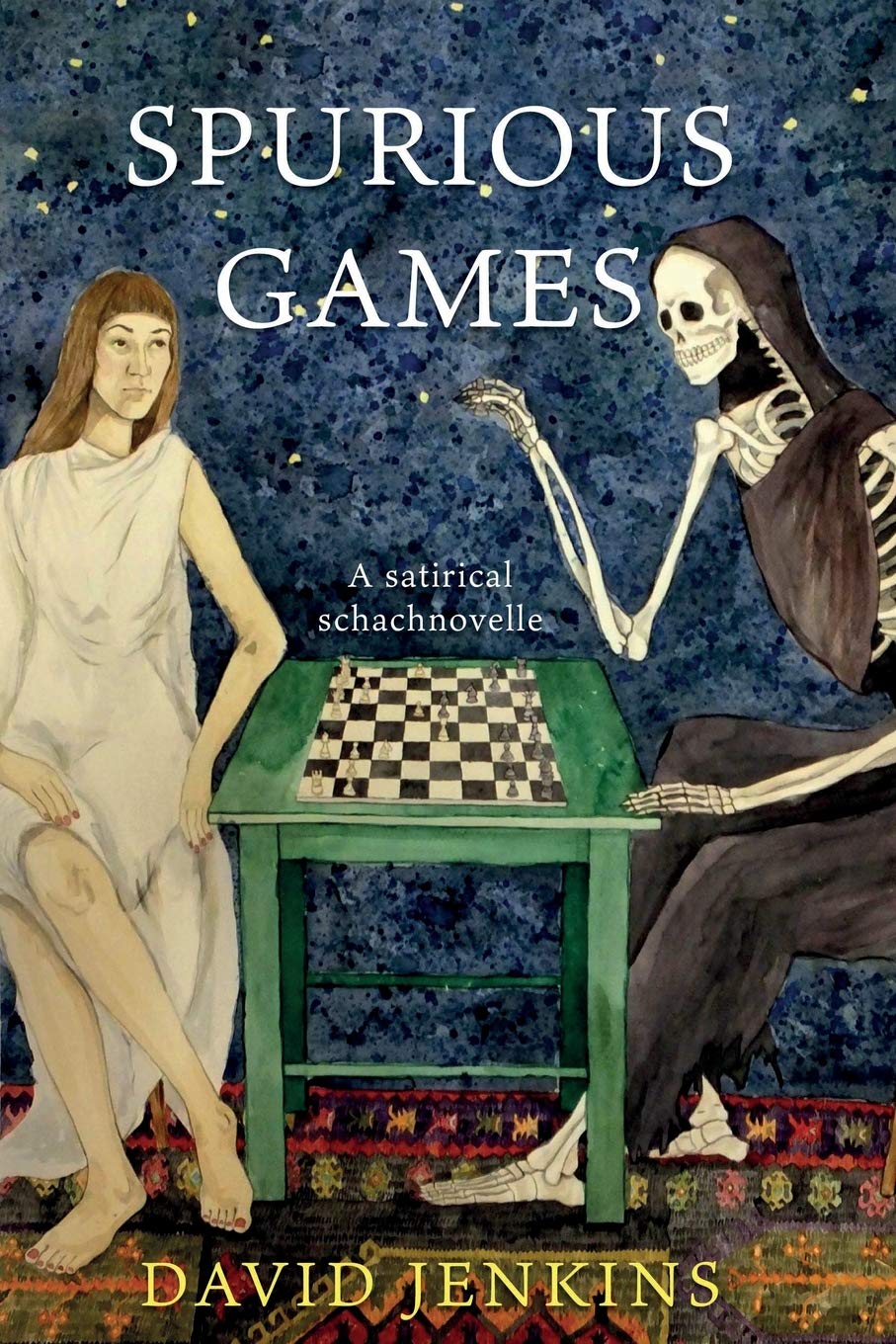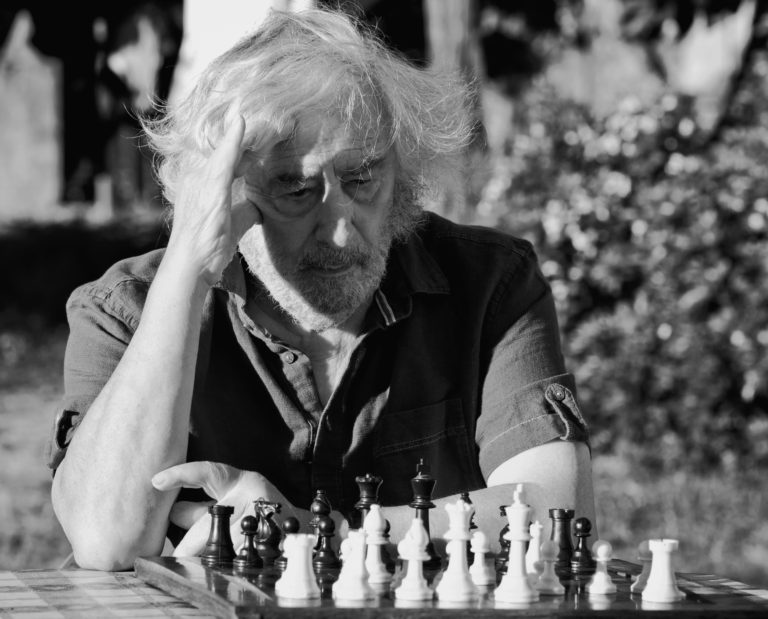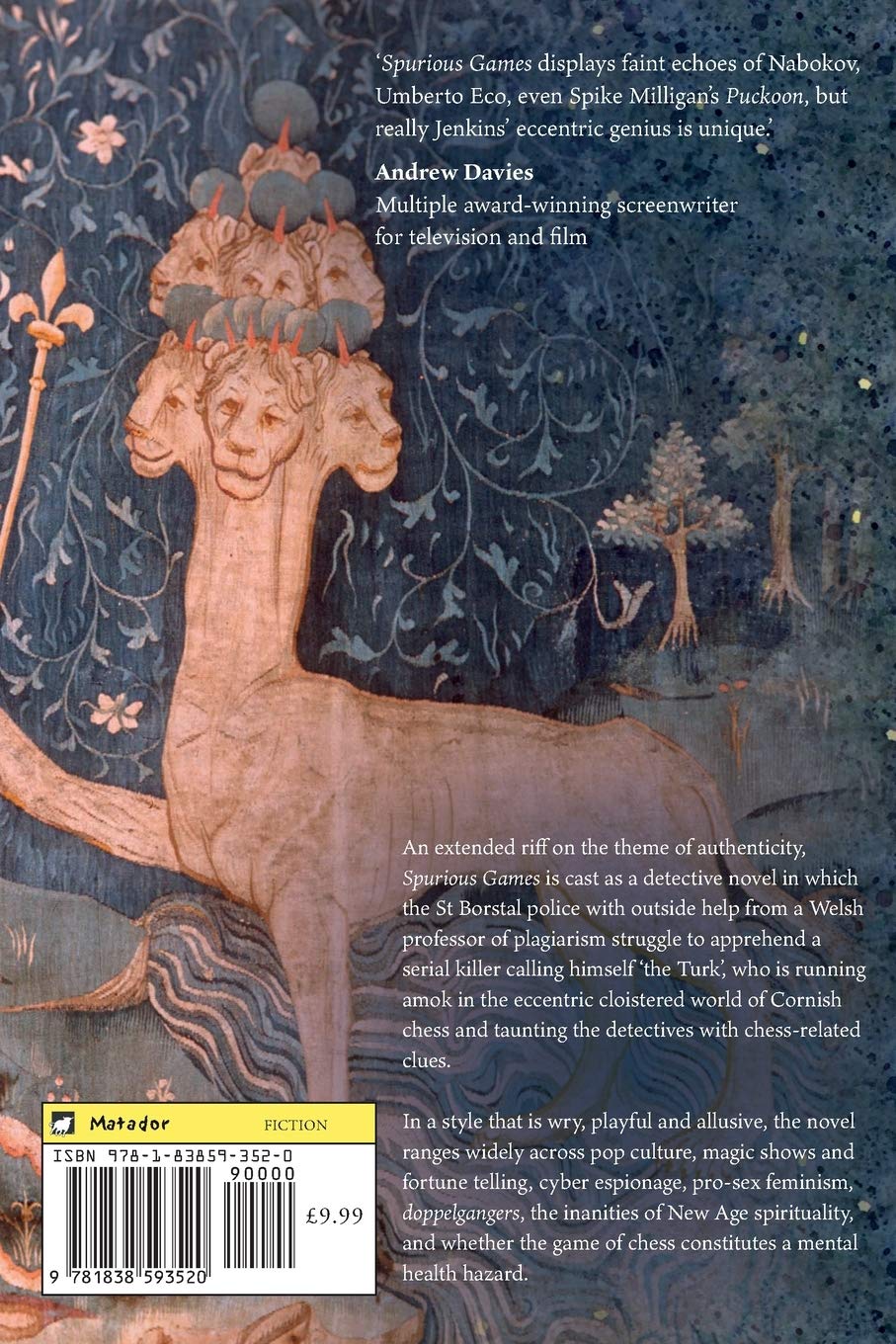Spurious Games: David Jenkins

From the publisher:
When a local chess player is discovered dead, Detective Inspector John Logos of Cornwall s St Borstal Constabulary is called in to investigate what turns out to be a serial killer running amok in the sedate world of Cornish chess. The detectives quickly find themselves as pawns in the game of an arrogant mastermind calling himself The Turk who taunts them with chess-related clues. Baffled, they call in Caradoc Pritchard, an eccentric Welsh Professor, and together they must work against the clock to predict the killer’s next move.

While working at the University of the South Pacific, David played chess for Fiji as Board 4 in the 1994 Moscow Chess Olympiad, a memorable experience but one distinctly above his pay grade (think Eddy the Eagle). While in Fiji he also ran an experimental theatre group Stage Fright Aah!.
He was until 2016 captain of the Cornwall county chess team, hanging on to his place despite the ravages of old age. He is currently the President of the Cornwall Chess Association and teaches chess at Calstock Community Primary School. He has made a modest contribution to chess journalism, including the publication of a weekly chess cartoon, a brief selection of which can be found elsewhere on these web pages.
David has held chairs at a number of universities including Warwick and the University of the South Pacific. He is widely published in the field of qualitative evaluation, writing in a style of ‘curriculum criticism’ that offer readers a surrogate experience of educational programs, rendering them accessible to outside judgements.
In 2011, the American Evaluation Association awarded David’s study of a cross-European youth training initiative, A Tale Unfolded, the ‘Outstanding Evaluation of the Year’. The official citation noted that his report ‘deploys such literary devices as narrative vignettes, irony, metaphor and wit, seeing humour as a legitimate way of addressing ambivalences. The report pulls no punches, but does so with considerable grace and wit,’
Spurious Games is David’s first novel.
From the back cover:
“An extended riff on the theme of authenticity, Spurious Games is cast as a detective novel in which the St Borstal police, with outside help from a Welsh professor of plagiarism struggle to apprehend a serial killer calling himself ‘the Turk’, wo is running amok in the eccentric cloistered world of Cornish chess and taunting the detectives with chess-related clues.
“In a style that is wry, playful and allusive, the novel ranges widely across pop culture, magic shows and fortune telling, cyber espionage, pro-sex feminism, doppelgangers, the inanities of New Age spirituality , and whether the game of chess constitutes a mental health hazard.”
‘It seems his entire world for the last couple of years has revolved around his chess’, added Polgooth, ‘like a koala chewing legal highs in a eucalyptus tree’.
At the start of this novel, an overweight antisocial chess addict named Richard prematurely meets his maker as the result of eating a Poisoned Pawn from a chocolate chess set.
I was starting to get worried, but, at least to the best of my knowledge, I’ve never met David Jenkins, the author of this chess novel.
I’m not quite sure how I found myself as the chief fiction reviewer of British Chess News, but perhaps I’m the only member of their panel who ever reads fiction. Many chess players, I suspect, don’t, and that’s their loss.
So what we have here is a comic novel, a spoof on detective fiction if you like, set in the world of Cornish chess. Several of the characters have names redolent of prominent Cornish chess personalities. A serial killer is on the loose, and his victims are all chess players. The incompetent detectives working on the case receive mysterious emails from ‘The Turk’ offering chess-related clues.
The whole book is often hilariously funny. There’s a Chris Farlowe tribute band who posted online covers of their favourite 60s rock star, and were at one point known as the Farlowepian YouTubes. You’ll also meet a research fellow in Game Theory called Bernadette Madoff – and much more in the same vein. A knowledge of both popular and high culture (the Gospel of St John and the poetry of TS Eliot, for example ) will come in useful.
After four Cornish chess players meet untimely deaths the novel reaches its climax at the ICA, where a modern day replica of the Mechanical Turk is on display. Will the killer be unmasked before another victim (and GM Daniel King should be very careful) is checkmated? Chess journalist Stephen Moss has a walk-on part here, and other well known chessers (Andrew Greet, Michael Adams, Jack Rudd, Matthew Sadler) are mentioned en passant throughout the book.
I found the book very enjoyable and often extremely funny, even though we chess players don’t come out of it very well. Our Cornish colleagues, it seems, are either grossly overweight or unhealthily underweight, are unsociable loners, are often unable to drive a car, and are prone to believe in conspiracy theories such as the Nibiru Cataclysm and hang onto every word of David Icke. Not very different, then, from chess players in my part of the world. If you look in the mirror you might not like what you see.
The back cover quotes award-winning screenwriter Andrew Davies, who found echoes of Nabokov, Umberto Eco and Spike Milligan. Yes, I can see all of that, but for me it was as if the shades of Agatha Christie (The ABC Murders, a clear inspiration, is namechecked on several occasions), PG Wodehouse and Robertson Davies had collaborated on a novel about Cornish chess players.
The ‘whodunit’ part didn’t really work as, for me, the culprit was obvious from the start, but I rather suspect that was the whole point. The chess, as you’d expect from the President of the Cornish Chess Association, is mostly accurate, although the Fried Liver Attack is, rather strangely, described as an unsound tactical opening, and the participants play online on ICC at a time when most of the chess world had migrated elsewhere. The book does contain scenes of an adult nature, so it would be best not to leave it within sight of the likes of Cornish chess prodigy Barnaby Bude.
Apart from that, highly recommended for all chess players, even though you might not like the way you and your pawn-pushing brethren are presented. Although it’s extremely amusing, with laughs guaranteed on every page, there is also a serious undercurrent touching on a wide variety of issues both on and off the board. Well produced too, and, unusually for a work of fiction, beautifully illustrated. If you play chess and enjoy fiction, or even if you don’t, I’d urge you to give it a try. I’m sure the Netflix dramatisation won’t be far away.
Richard James, Twickenham 10th June 2021

Book Details :
- Softback : 324 (softback) pages
- Publisher: Matador (28 July 2020)
- Language: English
- ISBN-10:1838593527
- ISBN-13:978-1838593520
Official web site of Troubador / Matador

